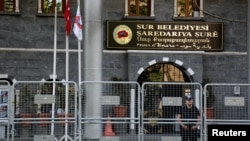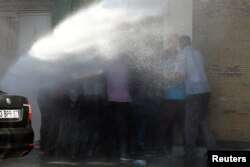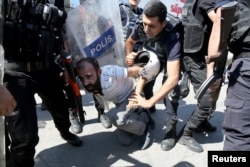Turkey's crackdown on the outlawed Kurdish rebel group the PKK is increasingly targeting the country's legal pro-Kurdish movement. On Sunday, 24 elected mayors of the main pro-Kurdish party, the HDP, were removed from office and replaced by government appointees called "trustees."
"To me, it is a step that came late. It should have been taken long before," Turkish President Recep Tayyip Erdogan declared Monday. "You, as mayors and municipal councils, cannot stand up and support terrorist organizations. You do not have such an authority."
Along with the 24 Kurdish mayors, four others accused of being linked July's failed coup attempt also lost their jobs.
An Interior Ministry website post defended the removals. "The state has exercised its fundamental duty to take necessary precautions against those infringing the will of nation," it said. The statement, without citing evidence, accused the mayors of providing financial and logistical support to terrorist organizations.
Special powers passed by a government decree were used to oust the mayors. Turkey is under emergency rule following July's failed coup, which allows for rule by decree.
Critics denounce move
Most of the Kurdish mayors in question were elected with massive majorities, including Leyla Imret, who secured a record 81.6 percent of the vote in Cizre. The consequences could be far-reaching, warns international relations expert Soli Ozel of Istanbul's Kadir Has University.
"To say you can actually disregard the will of the people, who with their votes have elected certain people into certain positions, is truly unacceptable, and it would mean an open declaration of political war against Kurdish citizens who are sympathetic to the HDP and probably some of them to the PKK," Ozel said.
The ruling AK Party had for many years electorally tried to break the power of the HDP in the predominantly Kurdish region. Although many local mayors had been under investigation for alleged links to the PKK, the government had balked at trying to remove so many by legal means.
Western pushback deemed unlikely
Analysts point out that the controversial move comes with Ankara aware there would likely be little pushback from its Western allies, which are courting Ankara for cooperation against Islamic State and regarding refugees.
The U.S. embassy in Turkey did not criticize the mayors' dismissals. The embassy only called for their replacement by elected representatives as soon as possible, and urged that due process be respected. The European Union, too, has offered little in the way of criticism.
The mayors' removals are part of a wider campaign. Last week, the government suspended more than 11,000 teachers accused of links to the PKK, mainly across Turkey's predominantly Kurdish southeast.
"It [the teachers' suspension] will be perceived as a racist, discriminatory cleansing, because they are all Kurds who've been chased away from the public sector," said political columnist Kadri Gursel of Turkey's Cumhuriyet newspaper.
Gursel warns it could add to growing alienation from the Turkish state by all opponents of the ruling party. "These Kurds are also secular Kurds; these are probably left-leaning Kurds. This is a historical and total estrangement between the state and non AKP segments of society."
Turkey's only Kurdish-language newspaper, Azadiya Welat, was closed by a court, along with the main pro-Kurdish newspaper Ozgur Gundem, on charges of supporting terrorism. Legal proceedings against parliamentary deputies of the HDP are also accelerating, with arrest warrants being issued.
‘New Turkish state’
International relations expert Ozel says the crackdown on the PKK and the pro-Kurdish legal movement could be part of a wider strategy of redefining Turkey in the aftermath of a failed coup in July.
"The ruling AKP and, in particular, the president want to put in place their project for a new Turkish state, before people come to their senses,” Ozel said. “For this you need a justification, ammunition, and the ammunition is the war against the PKK."
The crackdown on the Kurdish movement plays well with Turkish nationalists, and the AKP has the strong support of the nationalist MHP, whose parliamentary support would give it enough votes to rewrite the constitution, a goal of Erdogan.
HDP deputy Ertugrul Kurkcu, who is himself facing court, warns the space for a democratic legal Kurdish movement is being closed. "This promises us not a path of democratic progress, but a deeper conflict, which would shatter the foundations of Turkish statehood. If a space of maneuver is not maintained, then we can in one night plunge into civil war. This is a very, very risky situation."
Erdogan and his government insist the country has no Kurdish problem, rather only a terrorist one, accusing the PKK and what it says is its political affiliate, the HDP, of seeking to create and exploit ethnic tensions. The government policy appears determined not only to eradicate the PKK, but also pursue its battle against the legal Kurdish movement, which observers warn will likely close the door to a peaceful resolution of the nearly four-decade conflict.






